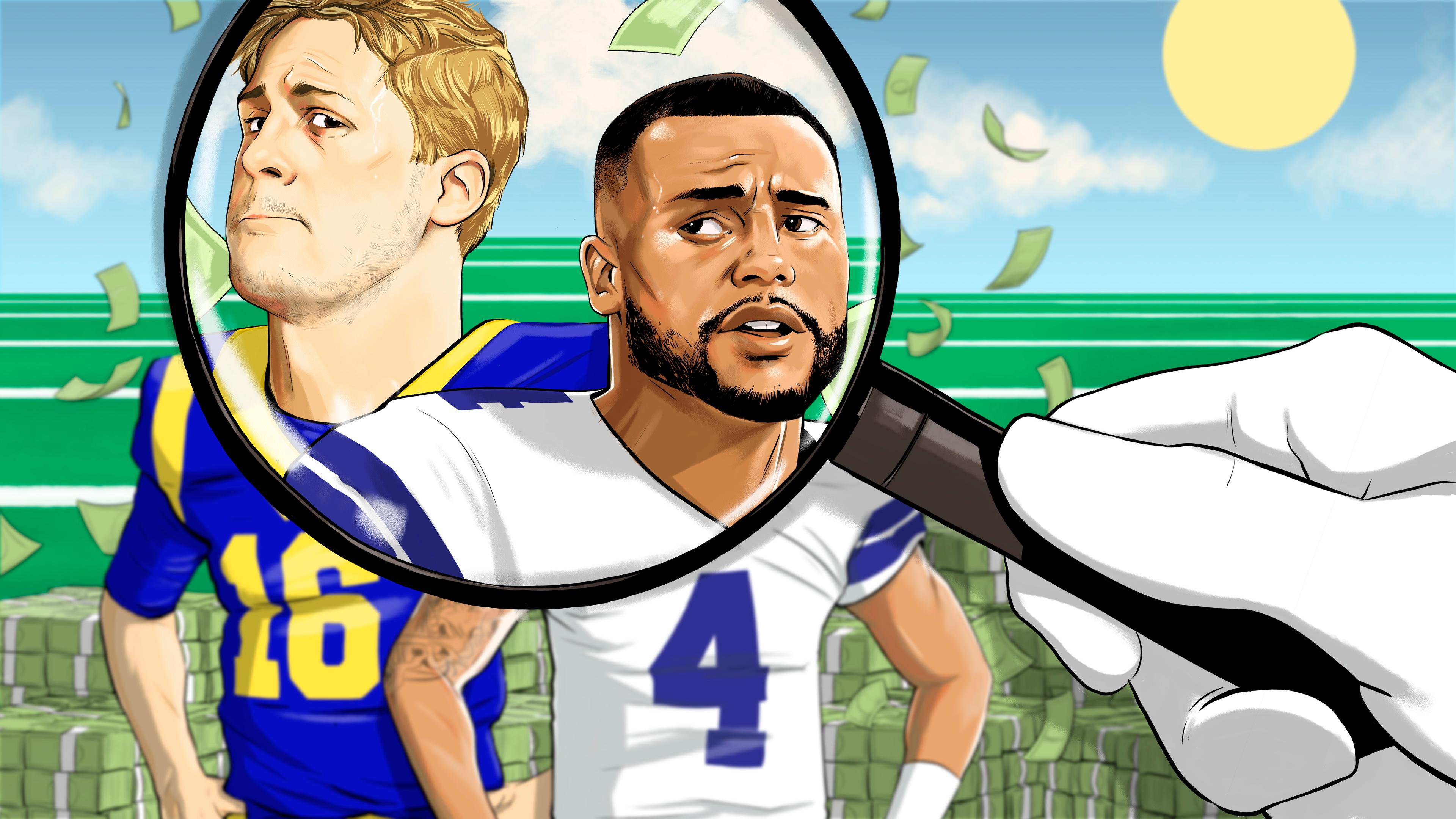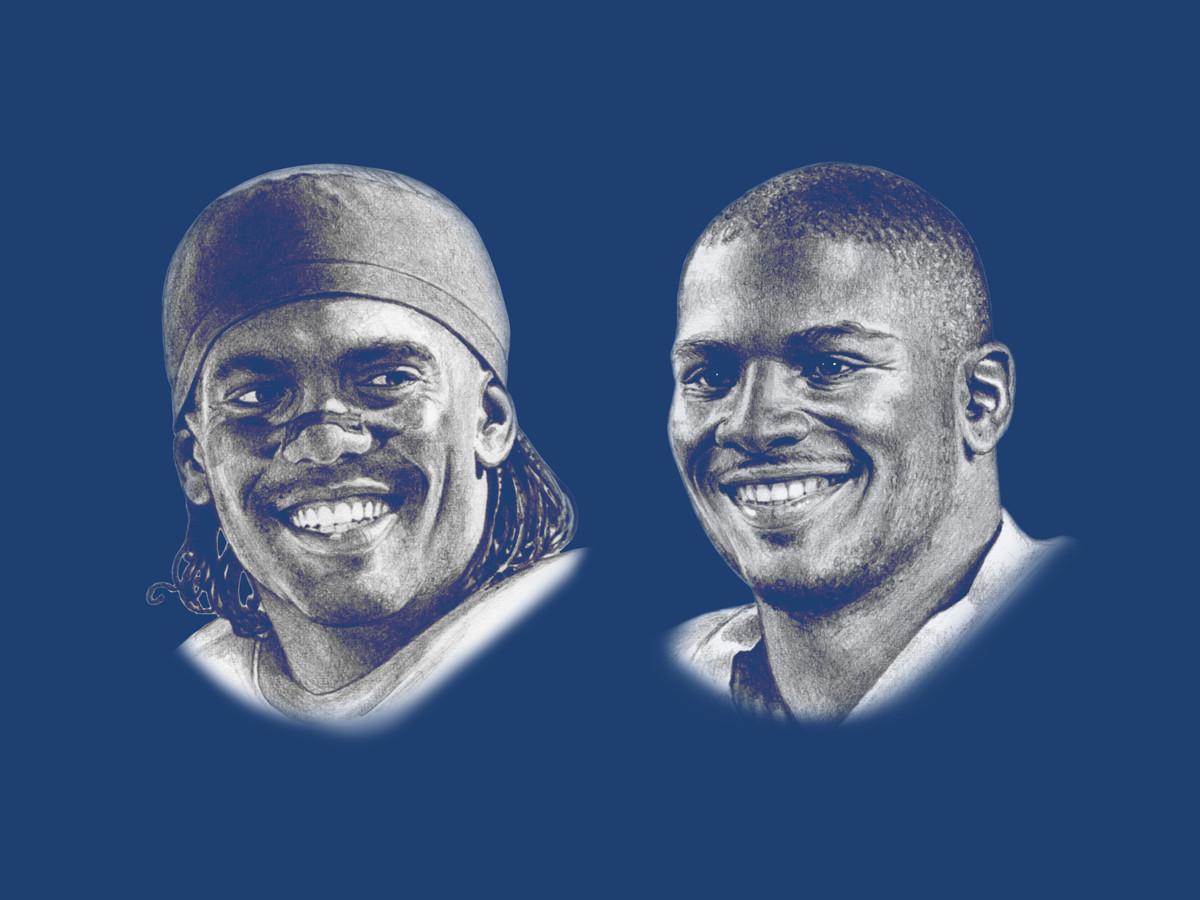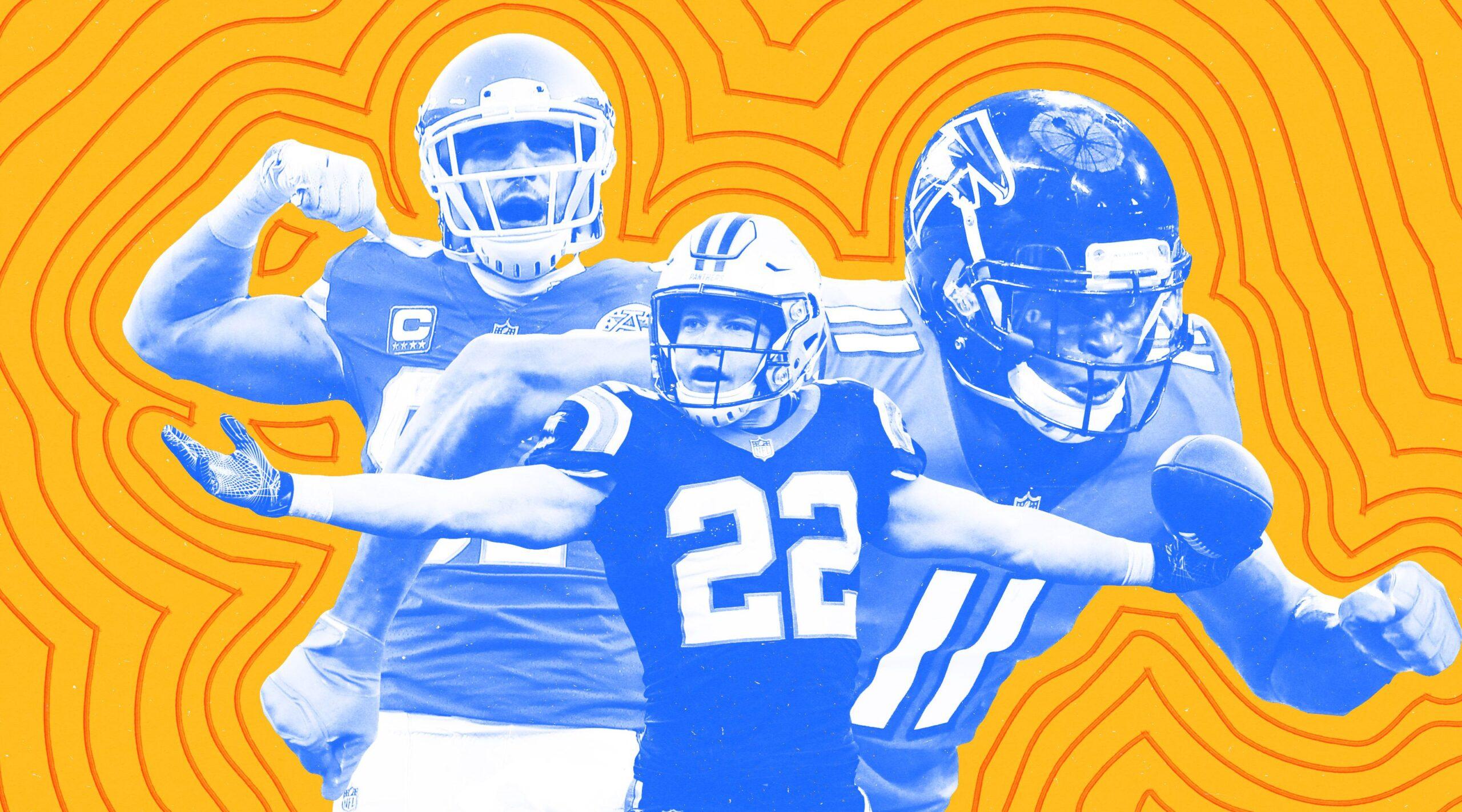Why NFL Teams Find It So Hard to Quit QBs
Cheap, young quarterbacks are the holy grail of modern football building blocks. So why do teams keep handing out $30 million extensions to less-than-elite passers?Is the NFL in a QB salary bubble? As the most important position in sports becomes more expensive, teams have to decide when it makes sense to pay their quarterbacks big money and when it’s time to move on. On Wednesday, The Ringer examines the decisions a team faces as its rookie quarterback approaches free agency, how a $30 million QB has become a bargain, and what the next big-money deal might look like.
There is nothing more valuable in the modern NFL than a capable quarterback on a rookie contract. That’s become an accepted truth, gospel for franchises that obsess over finding the smartest possible ways to build their roster. This line of thinking began with the emergence of Russell Wilson, the first player under the current CBA to show the advantage of having a cheap QB. When the Seahawks won the Super Bowl in the second year of Wilson’s deal, his salary cap hit was just over $681,000. He was Seattle’s 26th-highest-paid player in 2013.
In the years since Wilson’s breakthrough, other teams have followed the Seahawks’ blueprint. Front offices have seized on the opportunity provided by having young quarterbacks on low salaries to stockpile other assets. The Rams and Eagles took advantage of rookie deals for Jared Goff and Carson Wentz, respectively, by swinging aggressive trades for established stars and scooping up useful players like Ndamukong Suh and Malik Jackson. With Mitchell Trubisky making just $6.6 million last year, the Bears didn’t blink when trading for Khalil Mack and handing him $90 million guaranteed. And Chiefs phenom and reigning league MVP Patrick Mahomes will count for just $4.5 million against the cap this season—about 12 percent of what he’ll garner annually when his mega-extension likely goes into effect next offseason.
Yet even as the advantages of a quarterback on a rookie deal have become conventional wisdom, few teams have showed financial restraint toward the end of a passer’s initial contract. The Dolphins handed Ryan Tannehill a four-year deal worth $45 million guaranteed in 2015. The Jaguars gave Blake Bortles a three-year extension that included $26.5 million in guarantees after the 2017 season. (He’ll carry a $16.5 million dead money hit for the Jags this year.) Carson Wentz got a four-year, $128 million extension this summer (with about $108 million guaranteed), and it looks like the Rams and Cowboys will likely follow suit with Goff and Dak Prescott, respectively. Prescott reportedly wants upward of $35 million per season, a figure that would challenge Wilson’s new deal for the largest annual QB salary. These contracts don’t just amount to a raise—each one seems to come at the top of the market. “I 100 percent understand that it’s really intriguing when you look at it from a business perspective,” Falcons general manager Thomas Dimitroff says of the notion that teams could just start anew with another rookie QB. “But when I’ve read about everyone talking about that, I think, ‘OK, I get that for almost any other position,’ but not for the quarterback.”
NFL teams are averse to letting a known quantity walk before wading into the unknown, even with the benefits of a rookie QB contract staring them in the face, and even when the going rate for that decision is more than $30 million annually. It’s a striking disconnect in a league that has increasingly embraced analytics. So instead of investigating whether teams should eschew big-money deals in favor of pursuing another rookie option, we sought to find out why moves like this haven’t happened. “It’s so damn hard to locate the right quarterback for your system,” Dimitroff says. “And if you finally do, and your QB is thriving through those years, and all of a sudden you flip that and the next year you’re searching for someone that’s not that easy to find, I think you’re perceived as being a horse’s ass. That’s the reality.”
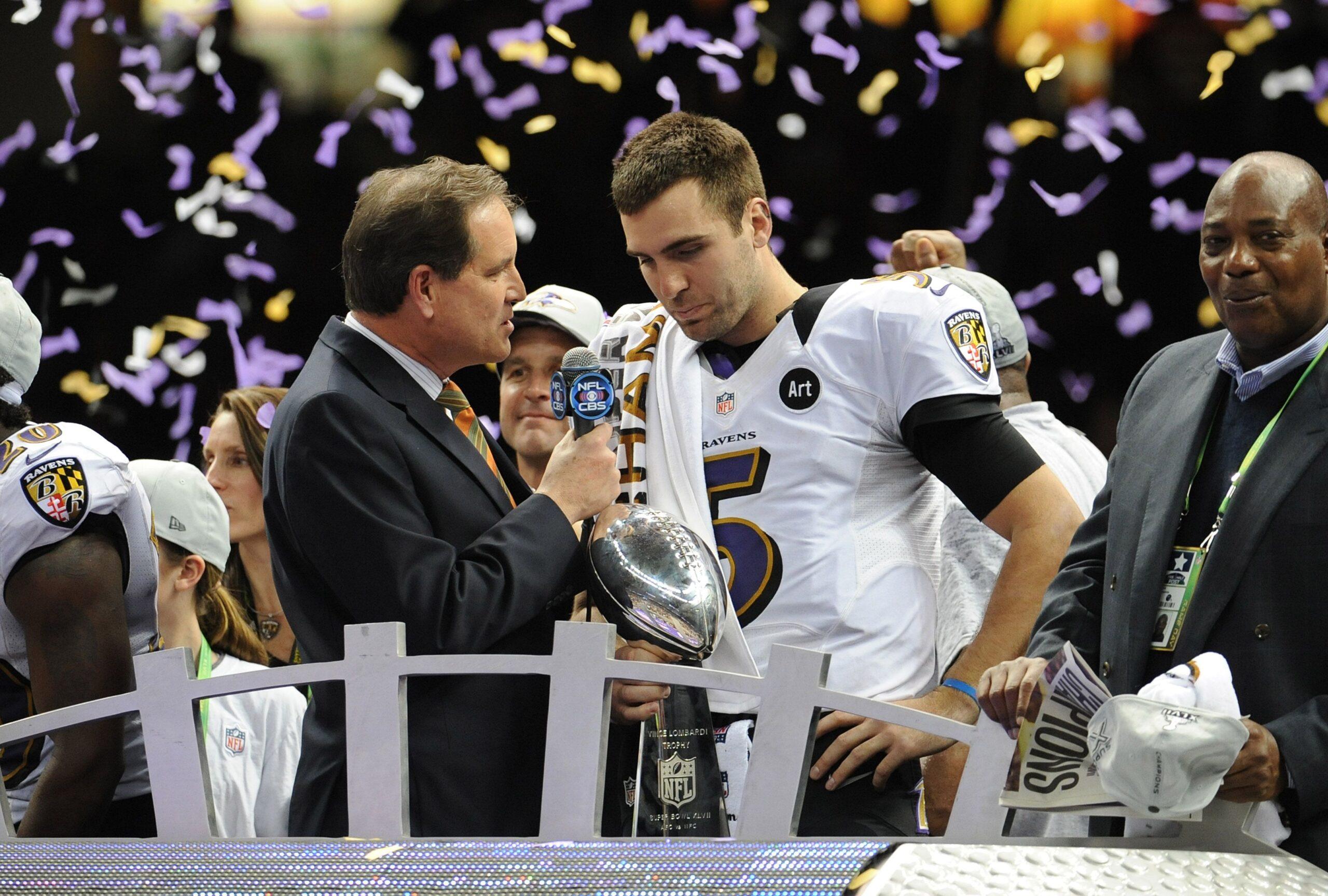
The analytics discourse around football has grown in recent years, with coaches like Doug Pederson adhering to math during fourth-down decisions and quarterbacks like Kirk Cousins parroting the wisdom of advanced studies on play-action passing. When it comes to choosing a quarterback, though, many executives retreat to the comfort of old-school methodology. That’s for a relatable reason: They want to remain employed. “People don’t really appreciate the extent to which job security drives a lot of the decision-making in the NFL,” says Joe Banner, the former Eagles president and Browns CEO.
NFL GMs are often inextricably linked to the first quarterbacks they bet on. So when a GM finds a QB who clears a certain threshold—and the floor for any season is raised dramatically—that can have huge ramifications for that executive’s future. “The consequences of keeping a B-minus quarterback consist of going 8-8,” Banner says. “The consequences of starting from scratch are winning four or five games for a couple years.”
With the constant turnover in the league these days, few GMs can survive a string of consecutive four-win seasons. Only seven GMs have served in that capacity with their current teams since 2010, and even that number is misleading. The Cowboys’ Jerry Jones and the Bengals’ Mike Brown are owners as well as GMs. The Saints’ Mickey Loomis is as much an executive for the Benson family as he is an NFL decision-maker. And Bill Belichick barely counts in this calculation. There just aren’t many high-level personnel folks in the NFL who have enough internal support to take such a massive risk. And even those who do have traditionally shied away from rolling the dice at the most important position in sports.
“The guy who could have would have been [the Ravens’] Ozzie Newsome, because he had such security from being there forever,” says former NFL agent and current CBS Sports analyst Joel Corry. “When [Joe] Flacco won the Super Bowl, if he wanted to auction him off to the highest bidder with the franchise tag, he could have done it and not caught any flak about it.”
Flacco’s post–Super Bowl extension—a six-year, $120.6 million deal with $52 million guaranteed—serves as a good case study in how these situations usually play out. His contract may look foolish in retrospect, but it came directly after Russell Wilson’s rookie season and the second year of the CBA, before teams fully realized how valuable cheap QB deals are. And while Flacco didn’t consistently look like a top-tier QB even back then, he was coming off arguably the greatest postseason run of all time. A colossal contract was all but inevitable, and likely would have happened even if the Ravens had the salary-cap knowledge that teams do today.
Newsome had been with the Ravens since their move to Baltimore in 1996. He was a local institution, and could’ve pulled off the high-wire act of ditching an established passer for the promise of a better one if he thought it was the wisest move. Banner says finding that person now would be much harder. “I couldn’t give you the name of someone willing to take that risk, knowing that sticking with the guy gives them job security, potentially indefinitely,” he says. “Taking the risk of trying to get better maybe gives them 12 months to 24 months before the street could be your close friend.”
People don’t really appreciate the extent to which job security drives a lot of the decision-making in the NFL.Joe Banner, former Eagles president and Browns CEO
The stakes are particularly high considering how few retread NFL general managers there are. While head coaches regularly get opportunities with multiple teams (four 2019 head coaches are retreads), GMs rarely get a second chance at the top job after failing the first time. The Browns’ John Dorsey and the Giants’ Dave Gettleman went straight into their current job after being let go by other organizations, but they’re the exception, not the rule. Even the Eagles’ Howie Roseman, who’s proved to be one of the best general managers in football during his second go-round with Philadelphia, returned to the job only under unique circumstances.
“If Chip [Kelly] had done well, he may never have gotten the chance to showcase what he’s been able to do over the past couple years,” Banner says. “Based on his background as a so-called ‘non-football’ guy, had [owner] Jeff [Lurie] not put him in the bullpen and put him back in the game to throw a couple scoreless innings, I’m not sure anybody would have given him another chance.”
By choosing to stick with competent if middle-of-the-road options at quarterback, GMs ensure themselves a job that only 31 other people in the world have—and an opportunity that may never arise again if this one doesn’t pan out. As long as that’s the case, many will go the safe route when it comes to finding QBs, salary cap logic be damned. “You’re asking them to not only risk the team’s success but risk their career on the possibility that they’re going to find somebody better,” Banner says. “It just takes more courage than anybody would have.”
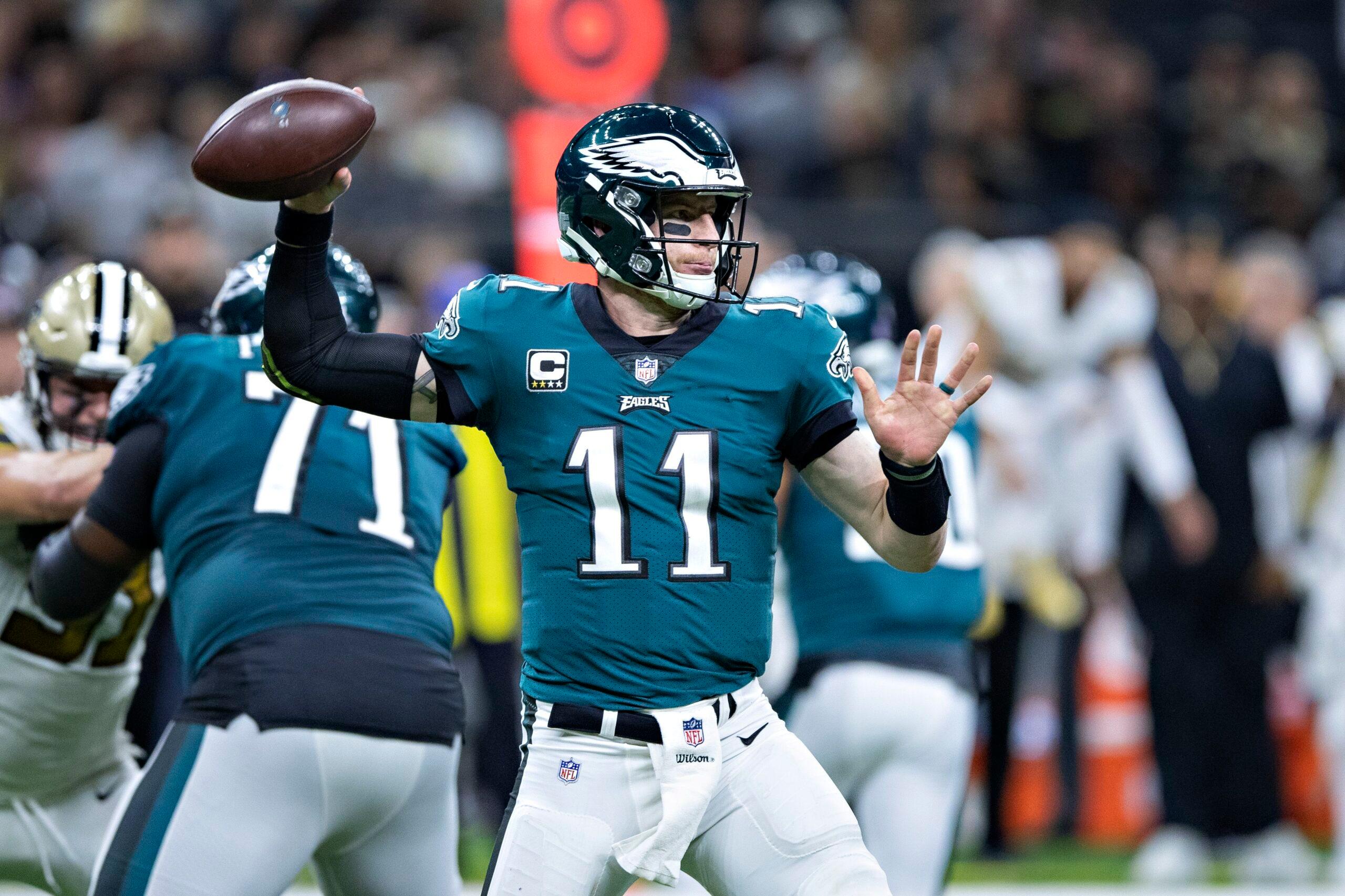
Fear of the unknown and front office self-preservation aren’t the only complicating factors when a team decides to pay top dollar to retain a less-than-elite QB. When an organization drafts a quarterback and anoints him the face of the franchise, sentimental ties both inside and outside the facility can also obscure rationality.
For many teams that have drafted a QB with a first-round pick in recent years, the move has been the latest step in a prolonged search for an answer at the position. After enduring Sam Bradford’s injury-plagued tenure, Rams fans believed Goff would give the franchise the QB stability it had lacked since Kurt Warner left in 2004. Wentz appeared to be the solution in Philly after years of scrambling following Donovan McNabb’s exit in 2009. Even the Tannehill contract made it seem like Miami was chasing dreams of Dan Marino. One of the chief directives for team ownership is giving its fan base reason to hope. If a 7-9 record feels like the worst-case scenario for a given season, that hope comes naturally—and is easy to sell. “I know every owner out there is like, ‘We have one goal, and that’s to win championships,’” says former NFL quarterback and current ESPN analyst Dan Orlovsky. “That’s not true. For a couple of them, maybe. But your no. 1 goal, because you are—to your core—a businessperson, is to make money off your franchise and have your franchise continue to be valuable.”
The commitment to a particular quarterback is often less financially driven for a team’s coaching staff. Head coaches in the NFL often carry more organizational power than their counterparts in other sports, and as more teams follow the trend of building their foundations upon the relationship between a play-calling head coach and a young QB, the emotional element in these cases could get especially knotty.
It’s almost like finding a wife. You search for so long, and you know how hard it is. And once you find that one, you don’t want to let her go.Former NFL quarterback Dan Orlovsky
Think about this dynamic in the context of any other job. Say that you have a protégé you work with for countless hours each week, one who you meet with daily. Say that your success as a manager is tied to the success of this employee, and that you spend years building a rapport, learning the ins and outs of each other’s personalities, and honing your communication to form a better working partnership. Then, four years into that relationship, say that your district manager informs you that this employee is being let go to save money, and that you have to start over with someone new. Unless that relationship had grown toxic, it would be a tough pill to swallow.
For teams like the Rams, Eagles, and Bears, that’s the reality. Orlovsky was with the Rams in training camp during Sean McVay’s debut season in Los Angeles. From the start, he saw a coach-QB duo that bonded over the way they’d been ridiculed the previous year. “Sean was mocked when the Rams hired him,” Orlovsky says. “And Jared Goff was mocked for a year and a half. There is that emotional connection. They want to prove they can because there were so many people saying they can’t.”
That fall, the coach and QB led the NFL in points per game. In their second season together, they went to the Super Bowl. Now entering Year 3, McVay and Goff have streamlined their process and dialogue even more. And when McVay signed a five-year extension in July, the assurance that the Rams would ink Goff to a similar extension was one of the motivating factors. “One of the things when you do accomplish [something], is that we did it, we did it together. We shared this bond,” Orlovsky says.
The relationship between a play-calling offensive coach and QB is as intimate as any within an NFL organization. “It’s almost like finding a wife,” Orlovsky says. “You search for so long, and you know how hard it is. And once you find that one, you don’t want to let her go.” As is the case in any marriage, concessions are necessary. In the football world, that can mean giving up the financial flexibility of a rookie QB contract in favor of maintaining a partnership that’s worked.
“You’ll change the way you go about things,” Orlovsky says. “You’ll start sacrificing things, because you spent such a long time searching for this one. And all of a sudden, you feel like you found that one that lets you live the life you want to live—you’ll find yourself doing things you may not have wanted to do in the past because you know what the alternative is. You know what the search for one looks like.”
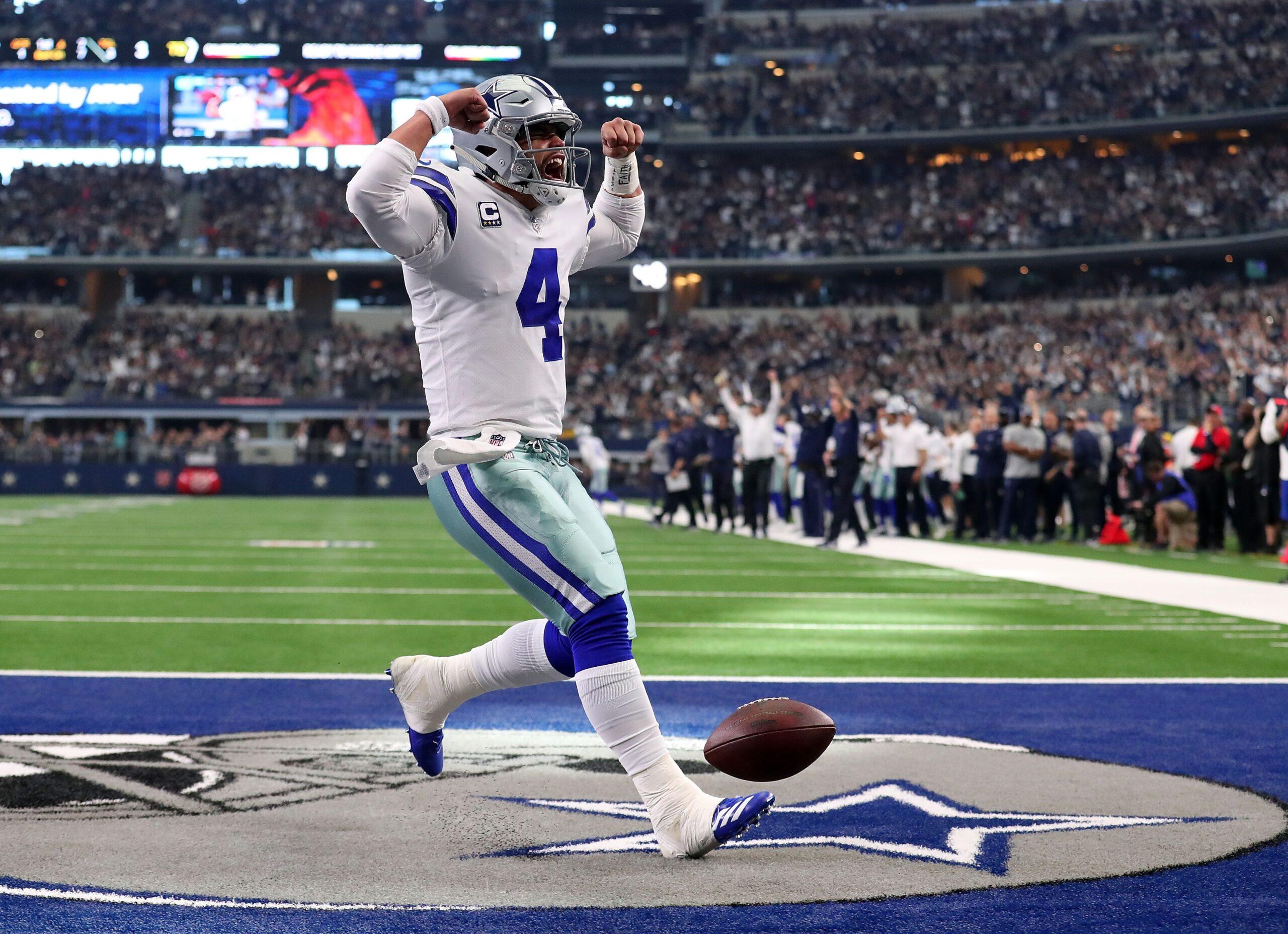
Any contract extension, big or small, sends a message to the rest of the team. And no message is louder than how a team decides to compensate its quarterback. In some cases, that means rewarding the wrong QB in lieu of extending more deserving players on the roster (see: the Blake Bortles debacle in Jacksonville). In other cases, choosing not to extend a proven quarterback can create unrest in the locker room.
A player with Prescott’s pedigree provides a useful example. The Cowboys have hesitated to give him a market-setting deal, and considering some of his shortcomings, that reluctance seems warranted. But Prescott has also won 32 games in three seasons as the Dallas starter. The validity of QB wins as a statistic aside, those results resonate with players. “What you’re telling me is that you don’t care,” Orlovsky says of how the Cowboys locker room would react if Prescott were allowed to walk. “You can sit up there and tell me all the time that you care about the end result, which is winning games, but you don’t. Because you just threw away the guy that’s been relatively successful at that. You would immediately turn your locker room against you.”
During the early years of Banner’s tenure with the Eagles, he says he didn’t fully appreciate just how much culture factored into a team’s success. And a franchise’s willingness to reward its players is a way to boost that culture. “We thought that once we had the right core of people, it was crucial to re-sign where we could and send the message that we valued that,” Banner says. “I think that’s more true at the quarterback position than anywhere.”
By choosing to move on from a semiproven quarterback, a franchise risks alienating other players who can come to feel like that front office is cheap. And such a decision can damage a locker room in other ways. According to Banner, pushing the reset button at quarterback can signal to players that an organization doesn’t value just how short a productive NFL career can be. For instance, a 30-something Pro Bowl linebacker wouldn’t be thrilled to learn that his team’s QB is being replaced by a rookie who’s never shown anything at the professional level. “Players know that if you don’t have at least a certain level of performance at the QB position, you’re capped on how good you can be,” Banner says. “If you have a QB that people believe in and the coach believes in, and that’s likely to be there for a long time, and is the unqualified leader of the team, that’s going to contribute to the security and the optimism and culture that you need to be successful.”
More than any other player on the roster, a QB is central to how a team creates culture. He’s the object of the entire organization’s focus, both inside and outside the building. That means any decision involving him is inherently complex. “Quarterbacks are like hippos,” Orlovsky says. “They’re very territorial. And a locker room is a quarterback’s territory. Football players like to be led.” By moving on from a QB who’s competent but not great, an organization indicates that the player it once told everybody to follow wasn’t worth following in the first place. Not only does that send the message, “We’ll get rid of a good player,” Orlovsky says. “You’re getting rid of our leader. I know that sounds corny, when people say, ‘Quarterbacks are the leader.’ But they are.”
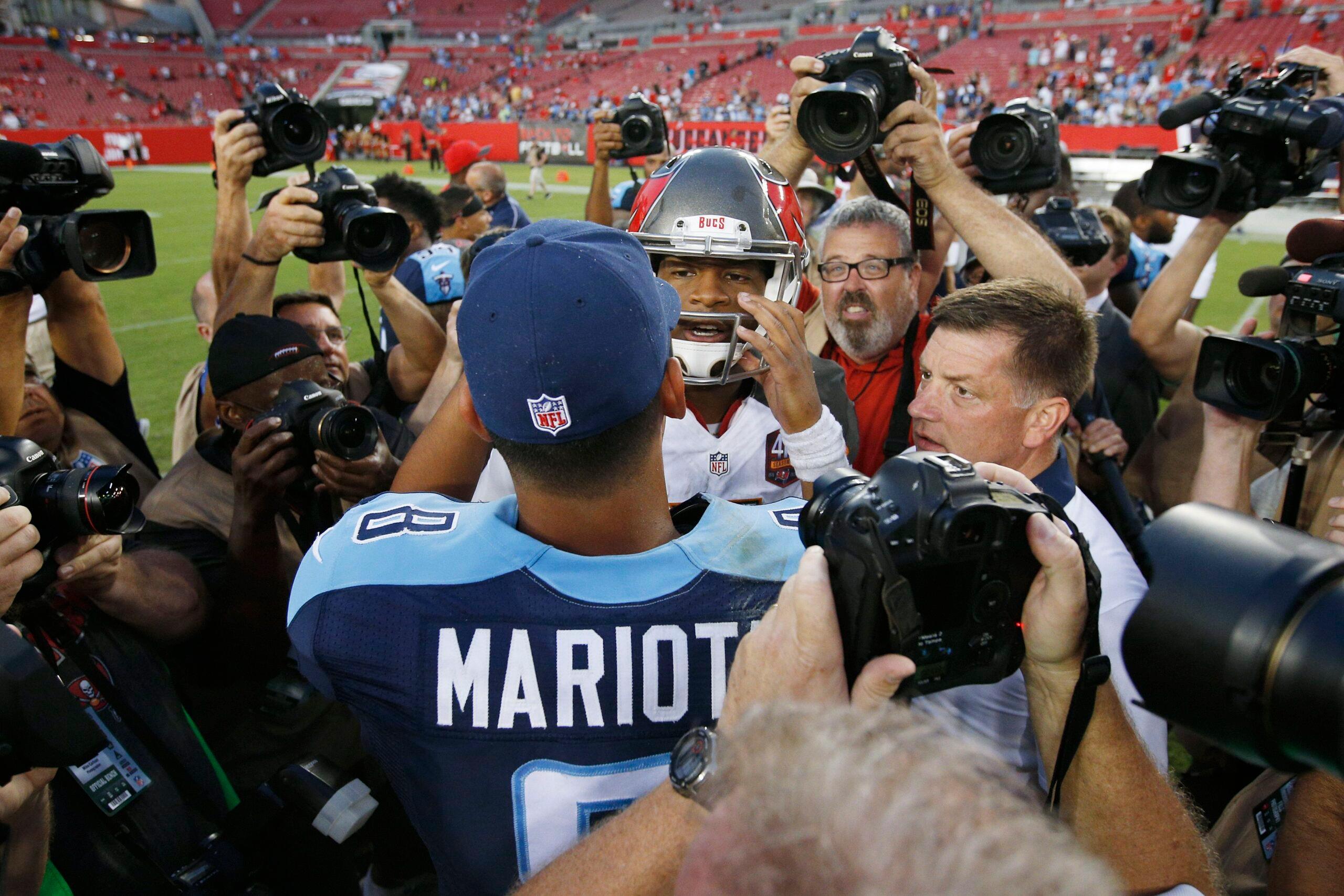
While the Goff and Prescott contract conversations have garnered national headlines, both the Rams and Cowboys are exceedingly likely to sign their QBs to huge paydays. The more intriguing cases involve Jameis Winston and Marcus Mariota, the first and second picks of the 2015 draft, who are entering the final year of their contracts and will force their franchises to either pay up or move on after 2019. Neither quarterback has been great (Winston has gone 6-16 with the Buccaneers over the past two years, while Mariota threw 11 touchdowns and eight interceptions last season), but neither has been disastrous. The Bucs ranked ninth in Football Outsiders’ passing DVOA in 2018, while Mariota has led Tennessee to three straight 9-7 finishes. Beyond their uneven play, both Winston and Mariota carry other concerns. Winston’s off-field history is a consideration; Mariota has struggled to stay healthy in the NFL.
In Tampa, several factors have aligned such that it could make sense for the Bucs to move on from Winston. General manager Jason Licht reportedly signed a four-year extension that coincides with the deal that head coach Bruce Arians was given in January. With their long-term job prospects relatively secure, the duo could sway ownership to go in a new direction if Winston has a lackluster 2019. The Bucs could also free up close to $100 million in cap space with a few logical cuts this offseason, which would set the table for a full-scale reset and a new QB. In Tennessee, the Titans recently traded for Ryan Tannehill as a form of Mariota insurance. If Tannehill outperforms the incumbent starter this season and wrangles the job from Mariota at any point, the Titans could elect to bring him back on a modest deal while looking to grab their QB of the future in next year’s draft.
If Tampa Bay or Tennessee moves on, it would provide more insight into the circumstances necessary for teams to give up on a QB. But neither case would represent a true paradigm shift in which roster-building and salary considerations took precedence over less analytical aspects of the decision. To that end, the Bears’ upcoming case could be more fascinating. Mitchell Trubisky showed plenty of flaws in 2018, but he oversaw a 12-4 season and won the NFC North title nonetheless. Chicago will have to make a decision on his fifth-year option next spring, and turning that down won’t be easy. Opting in would mean the franchise would be tying itself to Trubisky for close to $30 million in 2021. The longer teams wait, the more they have to pay for information they can use to make a determination about their QB.
If the past few years are any indication, though, quarterback is one position where money isn’t the end all, be all. There may come a day when a team decides to prioritize having a QB on a rookie contract above all else, but it’s unlikely to be anytime soon. “I think the shifting tide is very small, slow steps,” Banner says. “It’s happened, but I don’t think it’s happened to anywhere near the degree it should.”
